|
Buddhist Spectrum
Happiness: where it lies…
Venerable Nawalapitiye Ariyawansa Thera
Our life is temporary. A short period of time could be lived in this
world. If we do not think wisely, we will not be able to lead a
comfortable life. If someone thinks wisely, he will be able to make a
comfortable life within this short period.
If we do not learn the Buddha’s teachings, we won’t be able to
understand how to use our intelligence. If someone misuses his
intelligence, he is in the danger of committing severe demerits.
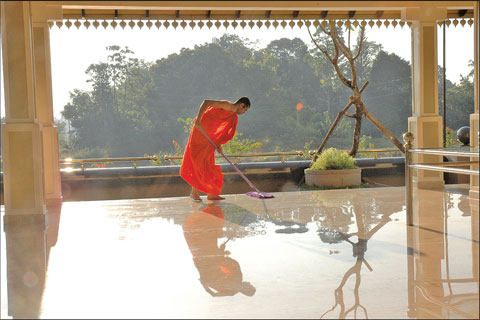 The Buddha shows “without knowing the facts, disgracing the
praiseworthy would be a cause to accrue demerits”. The Buddha also shows
“without knowing the facts, praising the disgraceful too would be a
cause to accrue demerits”. At the same time the Buddha shows that
“without knowing the facts, if someone is pleased with where he should
be displeased, would be a cause to accrue demerits”. The Buddha shows “without knowing the facts, disgracing the
praiseworthy would be a cause to accrue demerits”. The Buddha also shows
“without knowing the facts, praising the disgraceful too would be a
cause to accrue demerits”. At the same time the Buddha shows that
“without knowing the facts, if someone is pleased with where he should
be displeased, would be a cause to accrue demerits”.
Suffering and sorrow
If we do not know the sources of accumulating demerits, tendency to
commit demerits is higher. If demerits are committed, this life will be
a one that generates suffering and sorrow. If this life happens to be a
one that develops suffering and sorrow, a comfortable life
hereafter cannot be expected.
So, the person who wishes to have comfort in this life and life
hereafter should not take actions without knowing the facts.
The person whose wish is to rejoice in this world and to rejoice in
the life hereafter and never to be born in a place of great torment
should not be compelled to take actions without knowing the facts.
The person who wishes to lead a comfortable life must get used to
take actions knowing the facts well.
'The Buddha shows that if a praiseworthy person is praised knowing
the facts well one will accrue merits. At the same time if a disgraceful
person is degraded knowing the facts well, one will accrue merits. After
knowing the facts, if someone is displeased with where he should be
displeased, it also is a reason to accrue merits. At the same time,
after knowing the facts well, if someone is pleased with where he should
be pleased with, it also is a way for him to accrue merits. If we could
learn this Dhamma, we would be able to succeed in our lives.
No one can succeed in life without learning Dhamma. Most of the
people used to take actions automatically without knowing the facts.
If someone takes actions without knowing the facts, he is liable to
do evil things that accrue demerits.
By knowing the facts and getting used to take actions properly, one
will get a chance to abstain from accruing demerits and accruing merits.
Developing gratitude
The greatest benefit that the person who works knowing facts is that
he could identify the assistance he received and the assistance he is
receiving. Even he receives a minor assistance he admires it. Then
gratefulness develops within him. He becomes a grateful person. Grateful
person remembers to pay gratitude.
If someone cultivates gratefulness and the ability to pay gratitude
he won’t be a one who does an evil to his life. If someone has the
ability to pay gratitude and is grateful, then he will become a noble
person receiving benefits.
The noble person does good to himself.
He never does harm to himself. One who does not harm himself, he will
never harm others.
He always does good to others. So we must be clever enough to develop
the ability to take actions knowing the facts. May all be able to
develop the rare ability to take actions knowing the facts.
Translated by M A Samarsinghe
Marvelous contribution to the Dhamma
Rupa BANDUWARDENA
Located in a central position in Dehiwala, a few yards away from the
Dehiwala Municipality is Pinwatta Purana Viharaya which needs no
introduction. It is a splendid and an ideal location beaming with
religious fervor and atmosphere, where Sinhala Buddhist culture is kept
up and still continue to be nourished and enriched. It is a well known
ancient temple rich in tradition making a valuable contribution to the
Buddhists in and around Dehiwala. It continues to be greatly admired
today for the service it renders in diverse ways. The temple expansion
has been visionary. The present Nayaka Thera Venerable Walhaputenna
Nandasumana has created a wave of change comprising of all essential
temple requisites for the best functioning of the Dhamma school. It has
grown tremendously popular in all aspects.
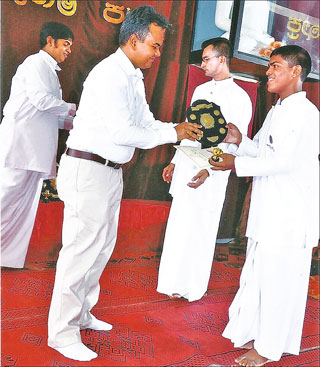 The Annual Prize Giving of the Sri Upananda Dhamma School held on
01st December 2012 was certainly a proud moment for all the participants
who displayed their talents wonderfully. An elaborate programme was put
into action in perfect order. After the formal procedure of lighting the
traditional oil lamp, the welcome song was presented beautifully. The
Venerable Nayaka Thera then read the Principal’s report giving a
detailed account, emphasizing the services rendered to the pupils in
Dhamma education, inspiring them to a lifelong love of learning. The Annual Prize Giving of the Sri Upananda Dhamma School held on
01st December 2012 was certainly a proud moment for all the participants
who displayed their talents wonderfully. An elaborate programme was put
into action in perfect order. After the formal procedure of lighting the
traditional oil lamp, the welcome song was presented beautifully. The
Venerable Nayaka Thera then read the Principal’s report giving a
detailed account, emphasizing the services rendered to the pupils in
Dhamma education, inspiring them to a lifelong love of learning.
Speeches and songs were presented by those who emerged winners at the
competitions held in oratory and recitations. They did perfectly fine. A
novel feature was the eloquent speeches presented in the most appealing
manner by the youngest and the smallest of the speakers.
The audience, mostly parents watched their children with appreciation
and applause.
The function was presided by the erudite scholar and well known Poet,
Most Venerable Buddhist Thera, Rambukkana Sri Siddhartha who opened the
doors for a new era through his intellectual awakening created by his
songs. He did enjoy the musically blended Buddhist songs sung by the
students. He was extremely happy and deeply appreciated the unique blend
of Buddhist songs with devotional music. The Ven. Thera in his Anusasana,
acknowledged the high standards maintained by this prestigious
institution. Venerable Lankananda Thera, described the services rendered
by providing Dhammalokaya and happily announced that the Sri Upananda
Dhamma school ranks best among the best performing Dhamma schools.
The Honourable Mayor of Dehiwala MC, Dhanasiri Amaratunga, who
performs his duty with honesty and dedication, emphasized the benefits
of Dhamma education and also the role of the temple in the light of
developing the area. He said that the recent spiritual progress and the
prosperity of the area could be attributed to the excellent work of the
temple.
The chief guest, Dr. Niroshan Seneviratne who is presently the
Consultant Surgeon, GU and Kidney Transplant, attached to National
hospital Sri Lanka, an old boy of the Dhamma school was recollecting the
days gone by which guided him to go into the world with courage and
confidence.
He recalled with pride how he won Dhamma prizes consecutively at past
prize givings, prior to his becoming a Medical student. He said the
pathway to his triumph was partly due to the Dhamma school and he warned
the parents to save the children from undesirable and harmful modern
trends.
The programme came to an end with the distribution of prizes by the
distinguished invitees who were also the old boys of the Sri Upananda
Dhamma school. Finally a rain of thanks and blessings were showered on
the organizers of the event.
Ruined ancient paintings
Theja Vidyarupa - Akuressa Group Correspondent
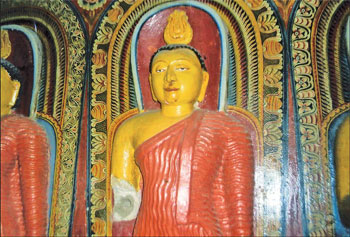 |
|
Partly
broken Buddha statue |
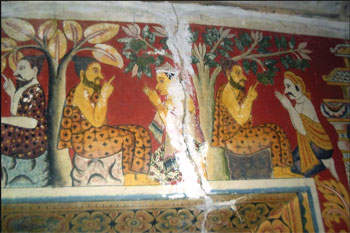 |
|
Damaged
wall paintings |
Wall paintings and several sculptures of historic Kolaweigama Raja
Maha Vihara in Pallegama, Deniyaya, belonging to the Kandyan period have
been ruined.
This temple, located at Kolawerigama close to the Ginaganga, has been
established about 500 years ago, according to its Chief Incumbent Ven D
Dhammika Thera.
Currently many wall paintings are decaying and several parts of the
statues are damaged.
Dayaka Sabha and Buddhist societies in the area request the relevant
authorities to take necessary steps to preserve the decaying wall
paintings and statues.
Realization comes in silence
 Daavith was happy – the eleventh hour dawned at last. He has been
waiting for this moment. His elevation as the London Temple’s chief
patron is only a few days old. Now he can take a decisive role in the
temple’s upbringing. Daavith was happy – the eleventh hour dawned at last. He has been
waiting for this moment. His elevation as the London Temple’s chief
patron is only a few days old. Now he can take a decisive role in the
temple’s upbringing.
It was a tough journey for Daavith Wickramapala. He flew Sri Lanka
under the ‘asylum’ shelter, though in reality he had no safety issue in
his mother country. He was well secure with the government he had
canvassed for. His politician friends helped him apply for ‘asylum
seeking’ and now several years have lapsed since he is well settled in
Great Britain.
But there was some difference in his case. Wickramapala did not live
on dole. He believed in earning his living rightfully. He had his law
practice as well as time to author a few publications on migrant
politics. It earned him some reputation.
As a first gesture, Daavith thought it fit to give alms to the
temple. His wife and daughter prepared everything with utmost faith and
admiration for monks. The London temple was initiated by the Sri Lankan
monk order, and now it has one British monk who came from a forest
monastery.
They were offering what they had brought. But the second offering, he
politely declined. Wickramapala’s wife was a tad worried. Their menu
included rice, chicken curry, beef stew, pork and a few more delicious
meat.
As the English monk settled with rice, they came to know he is a
vegetarian.
This reminded Daavith of his good old university days when he used to
argue with his vegetarian friends. He had some authoritative voice, as
he was the Buddhist Society’s president. The Buddha had never forced
vegetarianism. In fact even when Monk Devdath imposed five conditions,
the Buddha rejected them outright. That included vegetarianism, the
first of the conditions.
So he could easily beat his vegetarian friends. Vegetarianism might
have some health benefits, but it doesn’t have any religious worth,
Daavith could cite scholar monks to support this as a fact.
A few days ago he heard of a visiting English monk. His meal ethics
was also the talk of the town as vegetarianism was still not yet
established in this part of the country. Nonsense, the monks must accept
what the layman can give without demanding. That’s their discipline. He
did not have time to entertain his argumentative thoughts thanks to his
busy business schedule.
Daavith knew it is not proper to look at the monks taking their alms.
But he could not help taking a secret glance at this monk. He was eating
rice calmly, one chunk at a time.
He was calmer than other monks who almost devoured food in a hurry,
Daavith noticed.
As the English monk enjoyed his quiet course, Daavith recalled his
village temple. It resembled a forest sanctuary with many animals
roaming freely. The monks used to feed them. Although the London Temple
too has a few trees grown, it never had the village temple’s feel. No
animal dared roaming in these highly urbanized premises. The villagers
could never afford bacon – no, they have not even heard the word!
Then the head monk emerged from an opposite wing. He was patting a
cow’s head.
Daavith felt surprised. These memories did not come to him when he
argued with his friends over vegetarianism. The villagers never called
themselves vegetarians, though they consumed only vegetables,
home-grown. They simply did not have to kill animals.
The British monk’s face glistened with some radiance Daavith could
not understand. He felt humiliated about his own argument – that the
monks must eat what the layman can offer. Isn’t that what the English
monk does, eating what he is given? With a silent composure, he was
eating the rice-only meal.
Daavith Wickramapala felt too weak. The Buddha never forced
vegetarianism. He did not force otherwise either. When you have plenty
of vegetables, why do you still have to go for meat? Is it because of
its nutrient note, or simply because it tastes yummier?
The monk was beaming with smile. Unbeknownst to anyone else in the
crowd, the monk was teaching him a silent lesson.
When you become a vegetarian, it might mean the killers have to kill
one less. When you set the example, another might be inspired. More
vegetarians mean lesser killing. It encourages less violence.
“Father,” his daughter disrupted Daavith’s reverie of thoughts, “the
monks are going to start chanting.” It was time to concentrate on the
Buddha’s teachings chanted by monks, Daavith realized in silence.
[email protected]
 The World The World
(From Ven. Ajahn Chah’s talks, Compiled by Dr.Stalin
Wettimuny)
Continued from December 27
There is no conditioning of the mind occurring in the sense of a
‘self’ moving from this place to that place, or from that place moving
to this place. You are aware of the experience and then let go. There is
the knowing and then you lay it aside.
You let go without generating any further suffering for yourself.
This is because you know clearly what causes suffering to arise. When
you do encounter suffering you are aware of that suffering. As soon as
you start to experience suffering you automatically ask yourself the
question: where does it come from?
Suffering has its cause and that is the attachment and clinging still
left in the mind. So you have to let go of the attachment. All suffering
comes from a cause. Having created the cause, you abandon it. Abandon it
with wisdom. You let go of it through insight, which means wisdom. You
can’t let go through delusion. This is the way it is.
Coconuts distributed
W M P Nimal Wijetunga
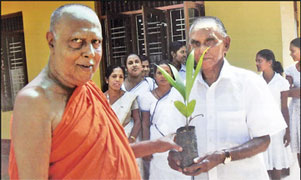 Two-hundred coconuts and arecanut plants have been distributed among
the villages of Bodhimaluwa to commemorate President Mahinda Rajapaksa’s
birthday. Two-hundred coconuts and arecanut plants have been distributed among
the villages of Bodhimaluwa to commemorate President Mahinda Rajapaksa’s
birthday.
The event was held at Sri Nagobodhi Vihara premises recently.
Golkanda Farm Founder A K D Piyaratne volunteered the donation.
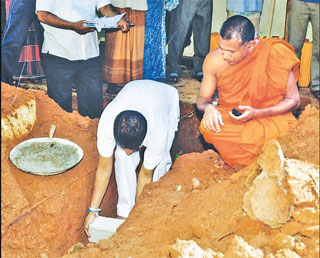 Foundation stone laid Foundation stone laid
P A Meyahamulaham Aranayaka Special Correspondent
The foundation stone was laid recently for the construction of a
‘Bhikkhu rest’ in Hathgampola Sri Maha Bodhi Vihara at a cost of Rs 10
million. The project is funded by philanthropist Mohan Dilman Jayarathna.
He has made significant donations on many occasions earlier.
The project is blessed by Ven Indrarathana Sri Rathana Thera, Chief
Incumbent of the Sri Maha Bodhi temple of Hathgampola, Aranayaka. |







